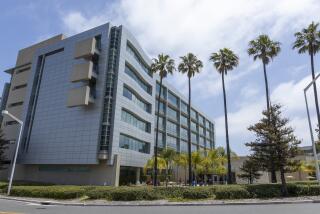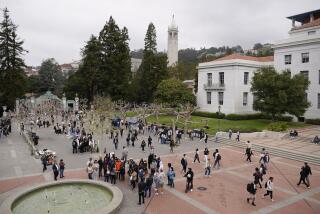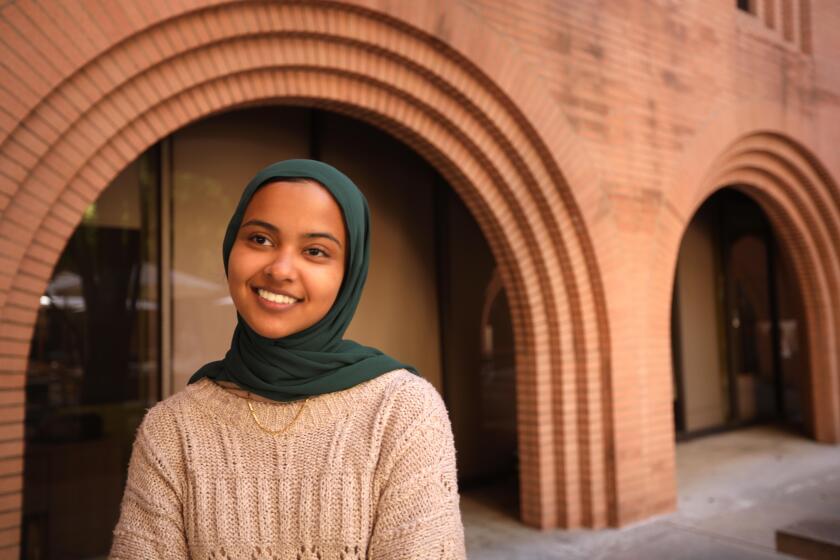A Cal State professor published eugenics-linked papers. Now come calls for a reckoning
A professor emeritus at Cal State University East Bay has been accused of publishing racist teachings linked to the discredited field of eugenics, forcing the university to decry “reprehensible” viewpoints while defending the right to freedom of speech.
The writings of economics professor Gregory Christainsen date back several years, including in publications identified by the Southern Poverty Law Center — which tracks extremist groups nationally — as having white supremacist ideologies. The writings include passages in which he compares the brain sizes and IQs of sub-Saharan Africans and Latinos to whites and Europeans, attributes the wealth of nations to those IQs, and rationalizes employment and pay discrimination along racial, ethnic and gender lines.
The controversy over Christainsen came to public light last week during a meeting of the CSU Board of Trustees, when a new president of CSU East Bay was announced.
“Our campus honors faculty that dabble in pseudoscience and eugenics ideology, like emeritus professor Gregory Christainsen in economics, who asserts in his work that people of sub-Saharan African descent — people like me and many of our students — have significantly lower IQs than any other ethnicity,” Pascale Guiton, assistant professor of biology, said during the public comment portion of the meeting. “It is appalling and scary to know that he and others like him get to teach and evaluate Black students and Black faculty.”
More than 1,600 people have signed a student-led petition calling for Christainsen’s emeritus status to be revoked.
“As a proud Mexican American, I am appalled that CSU EB has tolerated a professor who publishes racist ideology while teaching at one of the most diverse CSU campuses,” Karen Parada, a master’s candidate in biology, said at the trustees’ meeting.
The controversy comes as campuses across the nation are stepping up efforts to repudiate those in their past who promoted eugenics — a horrifying ideology that sought to use science to improve the human race by promoting traits deemed superior and breeding out those judged undesirable. USC has stripped the name of former university President Rufus B. von KleinSmid from a prominent campus building. Stanford University announced it would remove the name of its founding president, David Starr Jordan, from campus buildings and streets. UC Berkeley recently disavowed a eugenics research fund.
Christainsen declined to comment for this story and referred a request for an interview to the university’s media relations department.
Guiton said she received an email from Christainsen after the meeting, in which he said he teaches course material that includes the average IQ of various population groups.
“There are established methods for evaluating the reliability and validity of the scores and their relevance to economic growth among other concerns,” he said, according to the email Guiton posted on Twitter and to which she referred a reporter. “It is not the case that people of sub-Saharan descent have the lowest average score of any population group in the world, although the scores are below the world mean.”
In a Monday message to the campus, outgoing East Bay President Leroy Morishita called the statements and views expressed by Christainsen “antithetical to the core values of Cal State East Bay” and condemned racism. But, he said, the university must uphold individuals’ 1st Amendment rights to free speech, “whether or not it agrees with the views of a faculty member or finds them reprehensible, as long as the expression is lawful, does not violate our antidiscrimination policies ... and comports with campus time, place and manner policies.”
“The cure for hateful and hurtful speech is to condemn it forcefully with our own protected speech, using our voices to challenge and discredit pernicious theories and views that our university has long rejected as bigoted, racist, and immoral,” he said.
Michael Lee, a professor of geography who is also chair of CSU East Bay’s Academic Senate, said that he was “shocked” by Christainsen’s writings when other faculty pointed them out to him this summer.
“Many of the claims that were made appeared to me to be eugenicist in nature ... not consistent with the values of the institution that I work for,” he said.
Lee said the articles quickly became a topic of discussion among faculty, but it was unclear what could be done. Christainsen is a tenured faculty member. The campus has policies governing professional ethics and the “time, place and manner” of free expression, but no specific policy governing academic freedom. It is uncertain if or how a CSU-wide policy on academic freedom would apply in this case.
“What is meant by academic freedom, what are the limits of academic freedom, and what are the responsibilities of a professor that is granted tenure?” Lee asked. “These are very big questions to which we actually don’t have policies ... It’s going to make it very challenging for a senate or the university to determine what is the appropriate thing to do.”
Lee said he is expecting a resolution to be brought to the Senate’s meeting Tuesday making a series of demands in regard to Christainsen. Such a resolution would not carry authority over Christainsen’s teaching or research activities, or his employment status.
In a blog post for Academe, published by the American Assn. of University Professors, former CSU East Bay professor and senate chair Hank Reichman wrote Monday that while Christainsen undoubtedly enjoys 1st Amendment rights, he may have violated the bounds of academic freedom, which requires that professors publish research conforming to accepted disciplinary and intellectual standards and allow students to contest the validity of fringe ideas in the classroom.
“Academic freedom grants considerable scope to the consciences of individual scholars, but it does not protect an individual right of professors to do whatever they wish in their research and teaching,” Reichman wrote.
More to Read
Start your day right
Sign up for Essential California for news, features and recommendations from the L.A. Times and beyond in your inbox six days a week.
You may occasionally receive promotional content from the Los Angeles Times.







